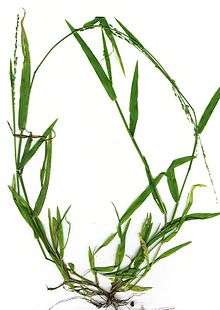Paniceae
Paniceae is a large tribe of the subfamily Panicoideae in the grasses (Poaceae), the only in the monotypic supertribe Panicodae. It includes roughly 1,500 species in 84 genera, primarily found in tropical and subtropical regions of the world.[2][3] Paniceae includes species using either of the C4 and C3 photosynthetic pathways, as well as presumably intermediate species.[2]Soreng, Robert J.; Peterson, Paul M.; Romschenko, Konstantin; Davidse, Gerrit; Zuloaga, Fernando O.; Judziewicz, Emmet J.; Filgueiras, Tarciso S.; Davis, Jerrold I.; Morrone, Osvaldo (2015). "A worldwide phylogenetic classification of the Poaceae (Gramineae)". Journal of Systematics and Evolution. 53 (2): 117–137. doi:10.1111/jse.12150. ISSN 1674-4918. ![]()
| Paniceae | |
|---|---|
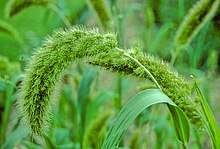 | |
| Foxtail millet (Setaria italica) | |
| Scientific classification | |
| Kingdom: | Plantae |
| Clade: | Tracheophytes |
| Clade: | Angiosperms |
| Clade: | Monocots |
| Clade: | Commelinids |
| Order: | Poales |
| Family: | Poaceae |
| Clade: | PACMAD clade |
| Subfamily: | Panicoideae |
| Supertribe: | Panicodae L.Liu (1980) |
| Tribe: | Paniceae R.Br. (1814)[1] |
| Genera | |
|
84, see text | |
| Synonyms[2] | |
| |
The tribe is subdivided into seven subtribes, but some genera are as yet unplaced (incertae sedis).[2] Species in the Paniceae have an ancestral chromosome number (monoploid number) of x = 9, while species with x = 10 formerly included are now recognised as separate tribe, Paspaleae.[4]
Subtribes and genera
Subdivisions:[2]
- incertae sedis
- Chloachne
- Homopholis (syn. Walwhalleya)
- Hydrothauma
- Hylebates
- Kellochloa
- Oryzidium
- Sacciolepis
- Thedachloa
- Trichanthecium
- Anthephorinae
- Anthephora
- Chaetopoa
- Chlorocalymma
- Digitaria
- Megaloprotachne
- Taeniorhachis
- Tarigidia
- Thyridachne
- Trachys
- Dichantheliinae
- Adenochloa
- Dichanthelium
- Boivinellinae
- Acroceras
- Alloteropsis
- Amphicarpum
- Chasechloa
- Cyphochlaena
- Cyrtococcum
- Echinochloa
- Entolasia
- Lasiacis
- Mayariochloa
- Microcalamus
- Morronea
- Oplismenus
- Ottochloa
- Parodiophyllochloa
- Poecilostachys
- Pseudechinolaena
- Setiacis
- Neurachninae
- Melinidinae
- Chaetium
- Eccoptocarpha
- Eriochloa
- Leucophrys
- Megathyrsus (syn. Pseudobrachiaria?)
- Melinis (syn. Mildbraediochloa, Rhynchelytrum)
- Moorochloa
- Rupichloa
- Scutachne
- Thuarea
- Tricholaena
- Urochloa (syn. Brachiaria)
- Yvesia
- Panicinae
- Louisiella
- Panicum (syn. Arthragrostis)
- Yakirra
- Cenchrinae
- Acritochaete
- Alexfloydia
- Cenchrus (syn. Cenchropsis, Echinaria, Kikuyuochloa, Nastus, Odontelytrum, Pennisetum, Snowdenia)
- Chamaeraphis
- Dissochondrus
- Holcolemma
- Hygrochloa
- Ixophorus
- Paractaenum
- Paratheria
- Plagiosetum
- Pseudochaetochloa
- Pseudoraphis
- Setaria (syn. Camusiella, Paspalidium)
- Setariopsis
- Spinifex
- Stenotaphrum
- Stereochlaena
- Streptolophus
- Uranthoecium
- Whiteochloa
- Xerochloa
- Zuloagaea
- Zygochloa
Gallery
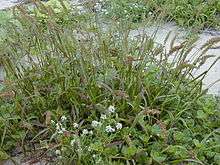
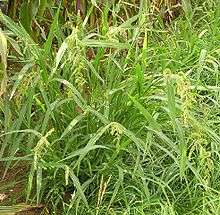
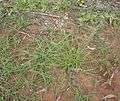
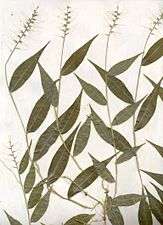
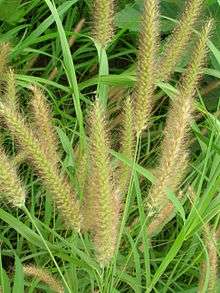
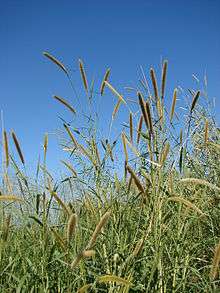
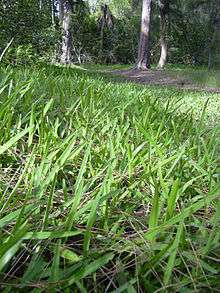 Stenotaphrum secundatum (St. Augustine Grass)
Stenotaphrum secundatum (St. Augustine Grass)
References
- Brown 1814, p. 582.
- Soreng, Robert J.; Peterson, Paul M.; Romaschenko, Konstantin; Davidse, Gerrit; Teisher, Jordan K.; Clark, Lynn G.; Barberá, Patricia; Gillespie, Lynn J.; Zuloaga, Fernando O. (2017). "A worldwide phylogenetic classification of the Poaceae (Gramineae) II: An update and a comparison of two 2015 classifications". Journal of Systematics and Evolution. 55 (4): 259–290. doi:10.1111/jse.12262. ISSN 1674-4918.
- Barkworth 2003, pp. 353–602.
- Morrone, Osvaldo; Aagesen, Lone; Scataglini, Maria A.; Salariato, Diego L.; Denham, Silvia S.; Chemisquy, Maria A.; Sede, Silvana M.; Giussani, Liliana M.; Kellogg, Elizabeth A.; Zuloaga, Fernando O. (2012). "Phylogeny of the Paniceae (Poaceae: Panicoideae): integrating plastid DNA sequences and morphology into a new classification". Cladistics. 28 (4): 333–356. doi:10.1111/j.1096-0031.2011.00384.x. ISSN 0748-3007.
Sources
- Barkworth, M. (2003). "Paniceae" in Flora North America. Vol. 25. pp. 353–602.
- Brown, R. (1814). A Voyage to Terra Australis. Vol. 2. p. 582.
- "Paniceae". Tropicos.org. 2013.
- "USDA: GRIN Taxonomy for Plants". ars-grin.gov. 23 March 2006.
External links
| Wikimedia Commons has media related to Paniceae. |
| Wikispecies has information related to Paniceae |
- Taxonomy browser (Paniceae) at ncbi.nlm.nih.gov.
